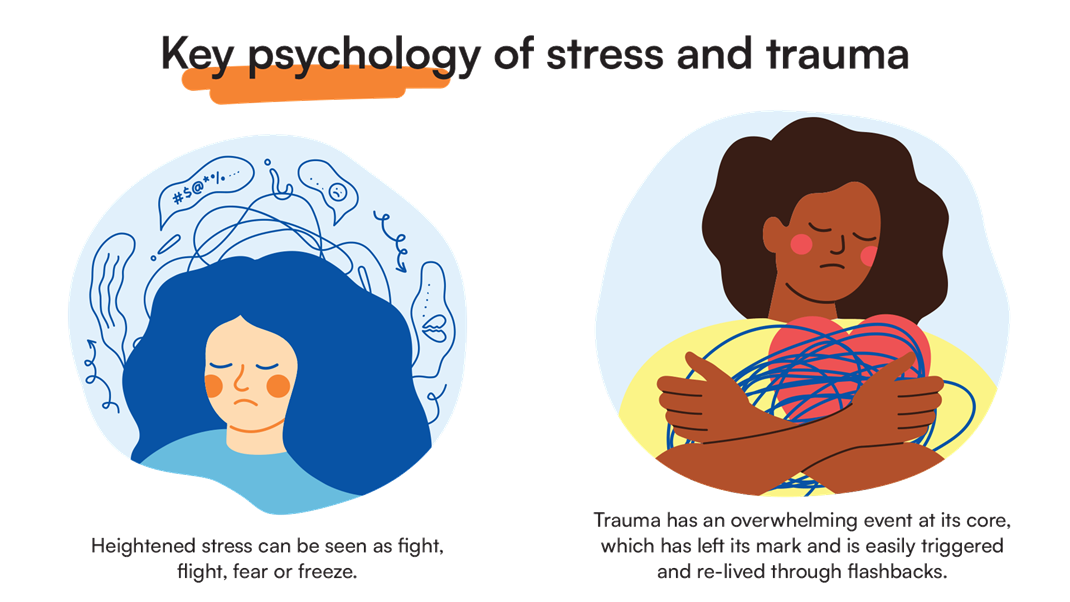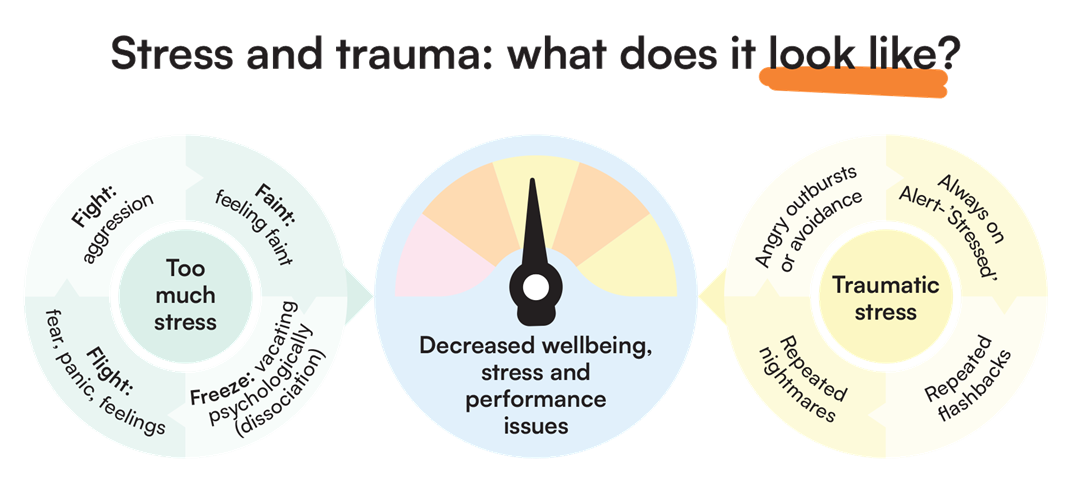Top Tips for Blue Light Team Members
This set of tips for blue light team members are intended to help:
- build healthy, mutual support between colleagues
- manage one’s own stress
- manage the stress of your colleagues
- reduce risk of burn-out
Things to know:
Stress: occurs when the demands made on us exceed the resources we have available to manage them
- When we feel stressed there are likely to be good reasons for this
- Good colleagues in strong teams, within psychologically smart organisations, help so much
- Be aware: stress once experienced as stimulating and exciting, may become unpleasant if repeated time and again
- Emergencies tend to create stress in themselves (e.g. pandemics)
- Emergencies accelerate the impact of existing vulnerability/stress
- Stress can also occur in anticipation of events
Traumatic stress: this refers to events that are often sudden and shocking
- These events have been described as like puncturing a ‘mental skin’
- We need time and sensible support to recover after such events; this should be anticipated in blue light teams
- Most of the time, the majority of people do recover if things are supportive and stable over the following weeks: look out for colleagues not recovering after 4 weeks
Repetitive stress: ‘the straw that broke the camel’s back’
- Events coped with successfully, sometimes for years, may still have had a cumulative effect
- This is hard to notice, gradually reducing psychosocial resilience and bringing us close to a tipping point
- In this state, any additional stress may suddenly prove too much, such that our coping ability collapses
Thinking patterns
- Growing our minds and learning, including post trauma growth, is protective
- Post traumatic growth is when, following a trauma, we discover and learn new things that build our psychosocial resilience, and we feel psychologically stronger
- Our minds need time and care to rebalance, rest and recover


Things to do:
Think of body, mind, relationships and networks
- Keep your body in good shape, with healthy living habits, including enough regular sleep
- Preserve leisure time, even short times out can make big differences
- In the thick of events, when you need to keep going, make a mental note of the need to recover when it’s safe and sensible to do so
- After a traumatic event take extra care when driving or doing anything potentially dangerous; put off difficult and demanding tasks temporarily
- After events, have regular check-ups, “Did I look after myself”, “My colleagues”, “How did we do as a team”?
Be sensitive to existing difficulties
- A colleague may have vulnerabilities that flare up when a new work stress occurs
Nurture hope: it helps us cope
- Support from each other gives hope, and hopefulness is very important for psychosocial resilience and wellbeing
- Learn new skills - growing together as a team promotes optimism
- See the glass ‘half full’ and acknowledge what we have to be grateful for
- Remember ‘tomorrow is another day’ and ‘this too will pass’
Get trauma-informed to help prevent it
- Learn what might be expected after a traumatic incident
- How you can support yourself and each other:
- Find out whether your service has a formalised trauma prevention protocol
- Learn about expectable responses to trauma
- Remember that post-traumatic type symptoms are not indicative of a disorder until at least a month after an encounter with trauma
- Keep a careful eye out for each other
Pillars of supporting each other well: trauma-informed approaches
- Use the strategies highlighted here:
- Social connection - value relationships
- We are in it together: collaboration versus isolation and often blaming, even bullying
- Self/peer compassion and self-care, body, mind, family, friends, networks
- Through team learning, the whole becomes greater than the sum of the parts, this gives the team strength and cohesion - nurture it
- Effective, psychologically-informed working and leadership: be trustworthy, look out for the team, be fair-minded, be kind where needed, be firm, be consistent, look for clarity of purpose and meaning of the job
- Organisational support - seek out ways to support everyone to feel safe physically and psychologically with transparency and trust
- Empowerment through voice, choice, knowledge and skills
- Stigma comes from ignorance and prejudice: counter stigma and isolation with education and challenge
Team culture
- It’s about each team member, and especially leaders, knowing what’s needed and when. Sometimes the team needs to deliver rapid action. Then there are times for reflection. Team structures need to deliver both
Decompression and post-event team reviews
- These are supportive ways to relieve the build-up of stress during a shift by sharing at its end and learning from each other
- Information may need to be obtained for legal and risk management purposes. If this is the case, be careful to protect the worker from unnecessary rumination on trauma
Be honest and prepare together
- Be honest about what each other will face in a work emergency task
- There may be personal psychological risks, and everyone should know the range of support available
- Pay attention to how we make meaning - ‘why we do this job’. Reinforce the value of the role as individuals and team members. Remember we need to look after ourselves too
Learn what stress is, and what clinical depression and anxiety look like
- Stress, anxiety and depression are usually the biggest causes of sickness in services
- Monitor your own and others’ stress
- Work out what works as ‘stress buster’ for you - it’s very individual
- Have your strategies ready and available, don’t assume you’ll find them when you need to
- Know what help is available both from your organisation and externally. There should be clear pathways and resources available in all organisations
- Confront the fear of the unknown by finding out what local HR policies say. Allay anxieties about help-seeking
Listening skills
- Listen very carefully
- Summarise
- Reflect back what you think you heard
- Check you have it right
- Defer judgement
- Repeat with open questions for example “Is there anything else you want to talk about?”
- Respond appropriately – beware of leaping into premature action, be open to working out a collaborative plan
- Develop the ability to empathically tune in without emotional contagion
- Relevant skills can be developed via mindfulness-based approaches, further learning is available on mindfulness here
Knowing who to speak with
- Be shrewd in identifying support both in and out of work and who you can share your feelings with safely
It's ok not to be ok
- It’s important that supervisors give the space for this to be true, for themselves and team members
- For supervisors to know how to handle team member’s distress
- Like layers of PPE, get your psychological (oxygen) mask on first before trying to help others
Resources and references
- Internally:
- Occupational Health
- External resources that may offer help:
- GP
- Improving Access to Psychological Therapies (IAPT)
- References:
- Jones, N, Fear N.T., Wessely, S., Thandi, G. and Greenberg, N. (2017) Forward psychiatry – early intervention for mental health problems among UK armed forces in Afghanistan European Psychiatry 39, 66-72
- Solomon Z, Mikulincer M. Trajectories of PTSD : A 20-year longitudinal study. American Journal of Psychiatry 2003 ; 1 63 : 659–666
- Stevenson D, Farmer P. Thriving at Work: The Stevenson/ Farmer Review of Mental Health and Employers. Department for Work and Pensions and Department of Health and Social Care; 2017
- Milligan-Saville JS, Tan L, Gayed A, Barnes C, Dobson M, Bryant RA, Christensen H, Mykletun A, Harvey SB. Workplace mental health training for managers and its effect on sick leave in employees: a cluster randomised control trial. Lancet Psychiatry 2017; 4: 850-85
- Other resources
- NHS Employers. NHS Staff Survey 2019. NHS Employers; 2020.
- Police Care UK. Policing: The job and the life survey Police Care UK; 2018
- Association of Chief Ambulance Officers. Supporting ambulance staff on mental health and wellbeing. Assocaition of Chief Ambulance Officers; 2019.
- College of Paramedics. Paramedic mental health and wellbeing: Your mental health. College of Paramedics; 2020.
- College of Paramedics. Guidance for managers on psychosocial support and mental wellbeing of ambulance personnel in a pandemic; 2020. Accessed 28 December 2020
- National Fire Chiefs Council. MIND Mental Health in the Emergency Services.
- Merseyside Fire and Rescue Authority. Critical Incident Stress Management; 2014
- Web resources:
- NHS People
- NHS Practitioner Health
- Psychological First Aid
- Mind: Blue Light Programme Research Summary 2016-18. London: Mind; 2018.
- March on Stress TRiM
- The Oscar Kilo Programme
- HeadFit - aimed at the military but trying to appeal to others too
- Critical incident stress management: Merseyside FRS
- MindEd Mindfulness e-learning session
- Other support groups and caring organisations you may find helpful include:
- The Samaritans – offers a 24- hour helpline for those in crisis. Tel: 116 123
- Cruse – Bereavement Care – Offers counselling, advice and support throughout the UK. Tel: 0808 808 1677
- Assist Trauma Care – Offers telephone counselling and support to individuals and families in the aftermath of trauma. Tel: 01788 551919.
- Drinkaware – offers facts, advice and support to manage drinking. Tel: 020 7766 9900
- Relate – offers relationship support for couples and families. Tel: 0300 0030396
- Stonewall – offers information, advice and support for gay, lesbian, bi, and trans communities. Tel: FREEPHONE 0800 0502020.
- Domestic Violence Intervention Project – offers advice and support to individuals and families who have experienced domestic violence as well as to individuals who want to change their behaviour. Tel: 020 7633 9181.
- The Ambulance Staff Charity (TASC)
- Our Frontline
- Just B
- Shout – Mental Health At Work
- College of Paramedics
- The Fire Fighters Charity - offers a range of mental and physical health support, as well as residential stays.
- Assist Trauma Care - provides information and help for people with PTSD and anyone supporting them
- PTSD999 - support and training for serving and retired emergency services personnel
Acknowledgements
The content for these tips draws upon four more detailed elearning sessions launched in 2021 for Blue Light Services Staff “Building Staff Psychosocial Resilience and Wellbeing”. We are grateful to the authoring teams for all their input and support, upon which these tips are built.
Next Back to Blue Light Home
Disclaimer
This document provides general information and discussions about health and related subjects. The information and other content provided in this document, or in any linked materials, are not intended and should not be construed as medical advice, nor is the information a substitute for professional medical expertise or treatment.
If you or any other person has a medical concern, you should consult with your healthcare provider or seek other professional medical treatment. Never disregard professional medical advice or delay in seeking it because of something that you have read in this document or in any linked materials. If you think you may have an emergency, call an appropriate source of help and support such as your doctor or emergency services immediately.
MindEd is created by a group of organisations and is funded by NHS England, the Department of Health and Social Care and the Department for Education.
© 2023 NHS England, MindEd Programme



